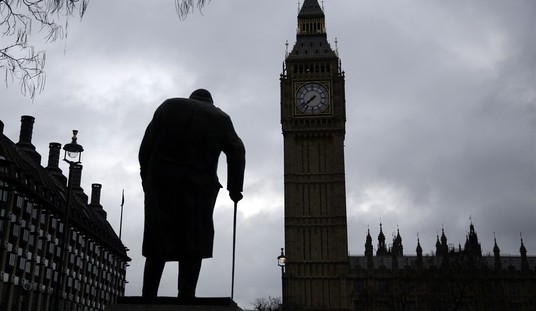[vimeo]http://vimeo.com/7152322[/vimeo]
Forget Mad Men and reliving the nostalgia of the 1960s, when did the left become obsessed with reliving and often reversing the progress of the last 150 years?
In the spring of 1938, Roosevelt decided he’d had enough of budget-cutting. He resumed spending, and soon the WPA rolls were back above 2 million, on their way to an all-time high of 3.4 million.
The lesson for Obama in all this is that stimulus works, and the sooner and more aggressive, the better. The vast infrastructure upgrades that were achieved by the WPA were in many ways a side-product, but an important one that is still paying national benefits. Given the country’s potholes, sagging bridges, rickety electric grid and spotty broadband coverage, a push today on new infrastructure would also provide lasting and necessary benefits. In the first round of stimulus spending, jobs were saved and some infrastructure projects got underway, but there’s still much more to do.
Of course, Obama faces challenges that his Depression-era predecessor didn’t. Roosevelt had stronger majorities in Congress. He could propose bold programs that required spending without risking gridlock or defeat. Nor did he inherit a culture of institutionalized deficits that stretched back 30 years, deficits that his opponents didn’t worry about when they wanted to fund wars and tax cuts but were quick to condemn when domestic spending was proposed. When Obama argues for a new round of stimulus, he’ll be standing against a distracting background of red ink.
Still, spending on jobs would be worth the cost. The WPA helped create a modern country and produced physical and cultural legacies that are still appreciated. Obama could use his considerable eloquence to re-create that vision. An America prepared today to meet the future will be applauded long after this recession is consigned to the history books. It’s a vision he hasn’t given us so far.
And when reliving 1938 fails, there’s always 1939:
Former Enron adviser Paul Krugman, writing in the New York Times, steps into the WABAC machine and guides us through some truly improbable history:
Here’s the situation: The U.S. economy has been crippled by a financial crisis. The president’s policies have limited the damage, but they were too cautious, and unemployment remains disastrously high. More action is clearly needed. Yet the public has soured on government activism, and seems poised to deal Democrats a severe defeat in the midterm elections.
The president in question is Franklin Delano Roosevelt; the year is 1938. Within a few years, of course, the Great Depression was over. But it’s both instructive and discouraging to look at the state of America circa 1938–instructive because the nature of the recovery that followed refutes the arguments dominating today’s public debate, discouraging because it’s hard to see anything like the miracle of the 1940s happening again.
What Krugman calls “the miracle of the 1940s” is more commonly known as World War II, a ruinous conflict that cost some 60 million lives, including more than 400,000 American ones, and that entailed the near-extermination of Europe’s Jewish population.
World War II is sometimes called a “good war,” meaning that few dispute American intervention was necessary or that we fought on the right side. But this easy moral clarity is possible only because the Axis actions that started the war were unambiguously evil.
In April 2009 we noted that David Leonhardt, a Krugman colleague at the Times, had praised the economic policies of Germany’s National Socialist Party. Now Krugman calls World War II itself a “miracle.” The Old Gray Lady is in the grips of utter madness.
Or, we could relieve 1909:
Colonialism today is a dead issue. No one cares about it except the man in the White House. He is the last anticolonial. Emerging market economies such as China, India, Chile and Indonesia have solved the problem of backwardness; they are exploiting their labor advantage and growing much faster than the U.S. If America is going to remain on top, we have to compete in an increasingly tough environment.
But instead of readying us for the challenge, our President is trapped in his father’s time machine. Incredibly, the U.S. is being ruled according to the dreams of a Luo tribesman of the 1950s. This philandering, inebriated African socialist, who raged against the world for denying him the realization of his anticolonial ambitions, is now setting the nation’s agenda through the reincarnation of his dreams in his son. The son makes it happen, but he candidly admits he is only living out his father’s dream. The invisible father provides the inspiration, and the son dutifully gets the job done. America today is governed by a ghost.
But ghosts function best without illumination:
A light bulb factory closes in Virginia as mandated fluorescents are made in China. It’s now a crime to make or ship for sale 75-watt incandescent bulbs in the European Union. Welcome to green hell.Thomas Alva Edison was a genius credited with the invention of many things — the phonograph, the motion picture, the incandescent light bulb, global warming. That last credit was given by those who rank light bulbs right up there with the internal combustion engine as ravagers of the planet.
The General Electric light bulb factory in Winchester, Va., closed this month, a victim, along with its 200 employees, of a 2007 energy conservation measure passed by Congress that set standards essentially banning ordinary incandescents by 2014.
Just as they are by fuel-economy standards, consumers are denied choice and the freedom to evaluate any possible benefits on their own by the nanny state. Washington’s force and coercion are necessary because it seems the great unwashed can’t seem to see the benefits or ignore the risks of compact fluorescents, or CFLs.
In Europe, light bulbs are already a controlled substance. The 100-watt bulb was banned last year and the 75-watt became illegal as of Sept. 1.
Not surprisingly, incandescent light bulbs there quickly became a hot item, flying off the shelves while they were still available. Der Spiegel reported that German customers leave hardware stores with carts piled high with enough incandescent bulbs to last 20 years. Garages and attics throughout the Old World are full of them.
Backwards ran the progressives until reeled the mind:
If one were to pick a point at which liberalism’s extraordinary reversal began, it might be the celebration of the first Earth Day, in April 1970. Some 20 million Americans at 2,000 college campuses and 10,000 elementary and secondary schools took part in what was the largest nationwide demonstration ever held in the United States. The event brought together disparate conservationist, antinuclear, and back-to-the-land groups into what became the church of environmentalism, complete with warnings of hellfire and damnation. Senator Gaylord Nelson of Wisconsin, the founder of Earth Day, invoked “responsible scientists” to warn that “accelerating rates of air pollution could become so serious by the 1980s that many people may be forced on the worst days to wear breathing helmets to survive outdoors. It has also been predicted that in 20 years man will live in domed cities.”
Thanks in part to Earth Day’s minions, progress, as liberals had once understood the term, started to be reviled as reactionary. In its place, Nature was totemized as the basis of the authenticity that technology and affluence had bleached out of existence. It was only by rolling in the mud of primitive practices that modern man could remove the stain of sinful science and materialism. In the words of Joni Mitchell’s celebrated song “Woodstock”: “We are stardust / We are golden / And we got to get ourselves back to the garden.”
In his 1973 book The Death of Progress, Bernard James laid out an argument already popularized in such bestsellers as Charles Reich’s The Greening of America and William Irwin Thompson’s At the Edge of History. “Progress seems to have become a lethal idée fixe, irreversibly destroying the very planet it depends upon to survive,” wrote James. Like Reich, James criticized both the “George Babbitt” and “John Dewey” versions of “progress culture”—that is, visions of progress based on rising material attainment or on educational opportunities and upward mobility. “Progress ideology,” he insisted, “whether preached by New Deal Liberals, conservative Western industrialists or Soviet Zealots,” always led in the same direction: environmental apocalypse. Liberalism, which had once viewed men and women as capable of shaping their own destinies, now saw humanity in the grip of vast ecological forces that could be tamed only by extreme measures to reverse the damages that industrial capitalism had inflicted on Mother Earth. It had become progressive to reject progress.
And at this point, much of “progressivism” remains trapped in a Mobius loop, constantly shuttling back and forth between wanting to relive their glory days of the 1930s by creating the next WPA and building the next Hoover Dam, and rather punitively wanting to relive their glory days in the early 1970s, by tearing it down.
How does this cycle of epistemic closure by America’s Ruling Class come to end?
Update: Of course, sometimes leftwing nostalgia gets silly…
Bill McKibben, an environmental campaigner from Vermont with a flair for showmanship, was rebuffed Friday morning in his effort to get the White House to reinstall one of the solar panels that President Jimmy Carter had placed on the White House roof.
They were removed by the Reagan administration, and some have been stored for years at environmentally active Unity College in Maine. Mr. McKibben and a group of students drove one of the panels down the East Coast in the hope of getting the Obama White House to accept it and return it to the roof to heat water for presidential showers and dishwashing.
Mr. McKibben met with three midlevel White House officials Friday morning who told him, politely, no dice.
…Well, sillier than usual, in this case.
Related: One the Pajamas homepage, Jeff Perren explores, “Beyond Politics: Removing the Progressive Drag on America.”









Join the conversation as a VIP Member